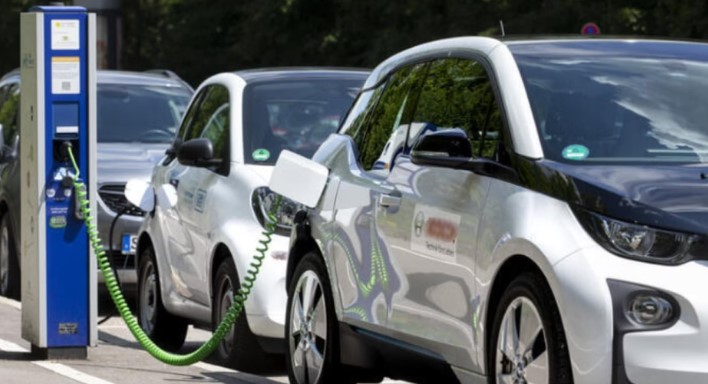1. Pakistan aim Vehicles Electricity
Pakistan has set an ambitious target to convert 30% of all vehicles to electric by 2030 in an effort to transform its transportation industry. This program demonstrates the country’s dedication to sustainable development and addressing climate change and is a component of the government’s Electric Vehicle (EV) strategy. As the globe moves toward green energy, Pakistan is committed to doing its part to promote environmentally friendly mobility options and drastically lower its carbon footprint.
This progressive strategy highlights the need for more environmentally friendly urban transportation, the integration of renewable energy sources, and the construction of necessary infrastructure, including EV charging stations. To address urgent environmental issues including smog and air pollution in crowded areas, Pakistan plans to expand the use of electric vehicles.
The government is establishing the groundwork for a more environmentally friendly future through international cooperation and public-private partnerships. In addition to modernizing Pakistan’s transportation system, this audacious project anticipated to boost economic expansion and raise public awareness of the advantages of electric vehicles.
2. What is Pakistan policy towards electric ?
The Pakistani government’s Electric Vehicle (EV) strategy aims to create a cleaner, more environmentally friendly transportation infrastructure. In order to significantly reduce its dependency on fossil fuels, cut emissions, and fight air pollution in its largest cities, Pakistan plans to have 30% of its automobiles electric by 2030.
The policy is a component of Pakistan’s larger plan to fulfill its climate change pledges and lower its carbon impact. It intends to incorporate electric buses, commercial vehicles, and two-wheelers in addition to promoting electric passenger cars. Ensuring a comprehensive strategy to electric mobility across all transportation sectors is the aim
3.Why does Pakistan aim need to switch to electric vehicles?
a. The positive aspects for the environment:
Pakistan must make the switch to electric vehicles (EVs), especially because urban air pollution has risen to dangerous levels. Cities like Karachi and Lahore are among the most polluted in the world, according to recent research. Pakistan can significantly lower pollution, particulate matter, and carbon emissions by lowering the number of traditional gasoline-powered vehicles.
b. Decrease in Dependability on Fossil Fuels:
Pakistan’s economy is suffering as a result of its increasing reliance on imported oil. In addition to lowering fuel prices, Pakistan’s adoption of electric vehicles will minimize its dependency on imports, perhaps stabilizing its economy over time.
c. Encouragement of Renewable Energy
Renewable energy sources are frequently linked to electric automobiles. Electric vehicles and renewable energy sources can work together to build a healthy ecosystem that lowers carbon emissions and helps the nation meet its energy needs.
4. Pakistan aim Infrastructure’s Function in Enabling Electric Vehicles
The establishment of the required infrastructure is one of the most important elements in guaranteeing the effective execution of the electric vehicle program. This covers the construction of EV-friendly roadways, the placement of charging stations, and the offering of technical assistance to EV owners.
a. Stations for charging EVs:
A shortage of charging stations is an essential barrier to the widespread use of electric vehicles. To make using electric vehicles easier, the Pakistani government dedicated to constructing a statewide network of EV charging stations. To make sure that EVs can be charged conveniently across the nation, these charging stations will be positioned thoughtfully along roads, in urban areas, and at important transportation hubs.
b.Help and Instruction for Technicians:
The requirement for qualified technicians and support personnel who can maintain and repair EVs will increase as the demand for EVs rises. The government intends to provide specialized training programs in partnership with the commercial sector to develop a workforce capable of doing electric car maintenance.
c. Intelligent Infrastructure:
Additionally, the government is developing smart infrastructure to increase the efficiency and accessibility of charging stations. For electric car users, features like location-based services, real-time updates on charging station availability, and online payment systems will enhance the entire user experience.
5. Pakistan aim Electric Vehicles’ Effect on Pakistan’s Economy
The switch to electric vehicles will boost Pakistan’s economy in a number of ways in addition to having positive effects on the environment.
a. Employment Creation:
Thousands of employment anticipated to be created as a result of the EV policy’s implementation, ranging from building infrastructure to manufacturing electric vehicles to offering after-sales services. A strong job market will result from the need for technicians, engineers, and infrastructure professionals, particularly among Pakistan’s younger population.
b.Fuel Savings:
The decrease in fuel usage is one of the main justifications for switching to electric vehicles. Compared to conventional cars that run on gasoline or diesel, electric vehicles are substantially less expensive to operate. Pakistan’s fuel imports may be significantly reduced as a result, boosting the nation’s balance of help to long position economic stablitity.
c. Greater Investment in Green Technology:
The development of green technology is directly related to the uptake of electric vehicles. It anticipated that Pakistan’s policy on electric vehicles will draw in both domestic and foreign companies hoping to take advantage of the rising demand for environmentally friendly solutions. This investment might result in the creation of regional EV manufacturing hubs, which would promote technological innovation and economic progress.
6. Responsible Public Transportation with Electric Buses
The launch of electric buses is among the most significant advancements in Pakistan’s electric vehicle agenda. The largest city in Pakistan, Karachi, already introduced its first fleet of biomethane hybrid buses, which predicted to eliminate all fuel expenses. The National Green Transport Project, which aims to update public transportation with eco-friendly solutions, includes these buses.
Electric bus adoption will improve public transportation’s efficiency, lower the transportation sector’s overall carbon footprint, and help reduce air pollution in large cities. Furthermore, the popularity of electric buses may act as a template for other Pakistani cities, extending the usage of environmentally friendly public transportation throughout the nation.
7. Difficulties in Making the Switch to Electric Vehicles
a. First Investment:
Compared to conventional automobiles, electric vehicles have a greater initial cost. The initial outlay needed to buy an electric car can be a deterrent for many buyers, despite the substantial long-term benefits. The government is addressing this by providing incentives and subsidies to lower the cost of EVs.
b. Public Knowledge:
Public understanding of the advantages of electric vehicles needs to be raised. EVs and their benefits are still unknown to many customers. Campaigns to inform the public about the long-term, financial, and environmental advantages of converting to electric vehicles being funded by the government.
8.Global Electric Vehicle Trends and Pakistan aim Contribution
The introduction of electric vehicles being spearheaded by numerous nations worldwide. EV adoption is advancing significantly in countries including the US, China, and Norway. Pakistan’s pledge to switch to electric vehicles by 2030 is in line with international green transportation trends. Pakistan is adopting aggressive measures to address climate change and lower its carbon emissions by joining this global movement.
Also Read: Petrol prices by-RS-1.35-per-litre Surprise increase pakistan govt




